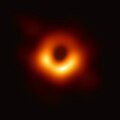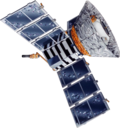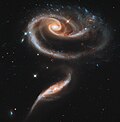LIGO (redirect from Laser Interferometer Gravitational-Wave Observatory)
Interferometer Gravitational-Wave Observatory (LIGO) is a large-scale physics experiment and observatory designed to detect cosmic gravitational waves and to...
90 KB (8,437 words) - 21:56, 15 June 2025
A gravitational-wave detector (used in a gravitational-wave observatory) is any device designed to measure tiny distortions of spacetime called gravitational...
37 KB (4,211 words) - 17:10, 10 May 2025
Cosmic Explorer is a proposed third generation ground-based gravitational wave observatory. Cosmic Explorer uses the same L-shaped design as the LIGO...
3 KB (263 words) - 04:15, 24 March 2024
the first dedicated space-based gravitational-wave observatory. It aims to measure gravitational waves directly by using laser interferometry. The LISA...
59 KB (5,410 words) - 06:59, 2 June 2025
The gravitational wave background (also GWB and stochastic background) is a random background of gravitational waves permeating the Universe, which is...
19 KB (1,955 words) - 22:06, 16 May 2025
by passing waves. Observatories like LIGO (Laser Interferometer Gravitational-wave Observatory), Virgo and KAGRA (Kamioka Gravitational Wave Detector)...
45 KB (4,835 words) - 22:00, 16 May 2025
Poincaré in 1905 as the gravitational equivalent of electromagnetic waves. In 1916, Albert Einstein demonstrated that gravitational waves result from his general...
106 KB (12,709 words) - 07:15, 2 June 2025
KAGRA (redirect from Large Scale Cryogenic Gravitational Wave Telescope)
Kamioka Observatory which is near the Kamioka section of the city of Hida in Gifu Prefecture, Japan. KAGRA is a project of the gravitational wave studies...
11 KB (1,110 words) - 14:49, 4 April 2025
perturbations, but are generated by gravitational waves during cosmic inflation shortly after the big bang. However, gravitational lensing of the stronger E-modes...
108 KB (13,202 words) - 17:04, 10 June 2025
portal Gravitational-wave astronomy – Branch of astronomy using gravitational waves Gravitational-wave observatory – Device used to measure gravitational waves...
70 KB (7,592 words) - 19:07, 6 May 2025
gravitational-wave search refers to the use of extremely large interferometers built on the ground to passively detect (or "observe") gravitational wave...
85 KB (9,839 words) - 07:32, 4 June 2025
and cosmic rays or gravitational waves. Thus, new types of observatories have been developed. Interferometers are at the core of gravitational wave detectors...
67 KB (702 words) - 04:40, 6 June 2025
Nanohertz Observatory for Gravitational Waves (NANOGrav) is a consortium of astronomers who share a common goal of detecting gravitational waves via regular...
11 KB (1,213 words) - 22:12, 18 May 2025
– (telescope) Laser Interferometer Gravitational Wave Observatory, an instrument for detecting gravitational waves LINEAR – (observing program) Lincoln...
140 KB (13,355 words) - 13:13, 24 April 2025
advanced experimental facilities for a multi-institutional observatory project in gravitational-wave astronomy to be located near Aundha Nagnath, Hingoli District...
12 KB (1,281 words) - 04:06, 25 May 2025
Taiji program (redirect from Taiji (gravitational wave observatory))
satellite-based gravitational-wave observatory. It is scheduled for launch in 2033 to study ripples in spacetime caused by gravitational waves. The program...
15 KB (1,837 words) - 17:07, 25 May 2025
The European Gravitational Observatory (EGO) is a consortium established to manage the Virgo interferometer and its related infrastructure, as well as...
5 KB (455 words) - 13:51, 28 May 2025
DECi-hertz Interferometer Gravitational wave Observatory (or DECIGO) is a proposed Japanese, space-based, gravitational wave observatory. The laser interferometric...
15 KB (766 words) - 02:51, 9 May 2025
Black hole (redirect from Cosmic vacuum cleaners)
September 2015, the LIGO gravitational wave observatory made the first-ever successful direct observation of gravitational waves. The signal was consistent...
166 KB (18,807 words) - 20:10, 15 June 2025
Big Bang (section Cosmic acceleration)
with cosmic time, making precise measurements difficult. Future gravitational-wave observatories might be able to detect primordial gravitational waves, relics...
150 KB (15,949 words) - 15:18, 4 June 2025
first direct detections of gravitational waves, GW150914 and GW151226, mergers of stellar-mass black holes. Gravitational-wave astronomy is born. No deviations...
152 KB (15,097 words) - 16:32, 22 May 2025
The Cosmic Background Explorer (COBE /ˈkoʊbi/ KOH-bee), also referred to as Explorer 66, was a NASA satellite dedicated to cosmology, which operated from...
33 KB (3,842 words) - 00:43, 4 May 2025
Void (astronomy) (redirect from Cosmic nothingness)
located in voids. This is because most galaxies are gravitationally bound together, creating huge cosmic structures known as galaxy filaments. The cosmological...
37 KB (4,463 words) - 23:56, 19 March 2025
"Limits on the Stochastic Gravitational Wave Background from the North American Nanohertz Observatory for Gravitational Waves". Astrophysical Journal....
21 KB (2,131 words) - 21:10, 15 March 2025
thence the power (rate of energy emission) of the gravitational waves. Thus, such a gravitational wave source is a standard siren of known loudness. Just...
56 KB (8,167 words) - 23:10, 5 June 2025
Accelerating expansion of the universe (redirect from Cosmic acceleration)
The Las Cumbres Observatory Collaboration; The VINROUGE Collaboration; The MASTER Collaboration (2017-11-02). "A gravitational-wave standard siren measurement...
42 KB (5,162 words) - 09:08, 11 June 2025
allowed equations of state. Future gravitational wave signals with next generation detectors like Cosmic Explorer can impose further constraints. When...
116 KB (13,893 words) - 18:02, 14 June 2025
Virgo interferometer (category Interferometric gravitational-wave instruments)
two Laser Interferometer Gravitational-Wave Observatories (LIGO) in the United States and the Japanese Kamioka Gravitational Wave Detector (KAGRA), because...
108 KB (10,800 words) - 20:37, 3 June 2025
Expansion of the universe (redirect from Cosmic expansion)
tension. A third option proposed recently is to use information from gravitational wave events (especially those involving the merger of neutron stars, like...
37 KB (4,556 words) - 13:18, 1 June 2025
Gravity (redirect from Gravitational interaction)
physics, gravity (from Latin gravitas 'weight'), also known as gravitation or a gravitational interaction, is a fundamental interaction, a mutual attraction...
83 KB (8,799 words) - 00:55, 16 June 2025

















